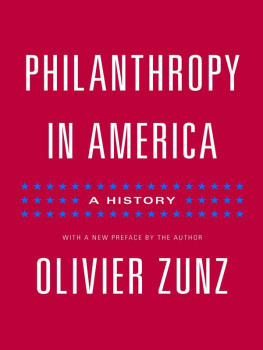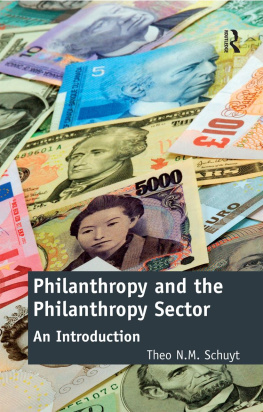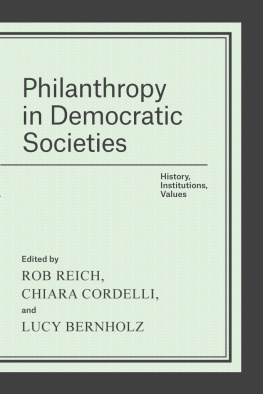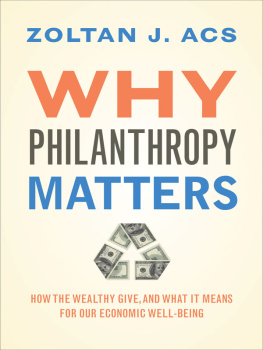
PHILANTHROPY IN AMERICA
POLITICS AND SOCIETY IN TWENTIETH-CENTURY AMERICA
Series Editors
William Chafe, Gary Gerstle, Linda Gordon, and Julian Zelizer
A list of titles in this series appears at the back of the book
PHILANTHROPY IN AMERICA
 A HISTORY
A HISTORY 
OLIVIER ZUNZ
Princeton University Press  Princeton and Oxford
Princeton and Oxford
Copyright 2012 by Princeton University Press
Published by Princeton University Press, 41 William Street,
Princeton, New Jersey 08540
In the United Kingdom: Princeton University Press, 6 Oxford Street,
Woodstock, Oxfordshire OX20 1TW
press.princeton.edu
All Rights Reserved
Second printing, and first paperback printing, with a new preface by the author, 2014
Paperback ISBN 978-0-691-16120-4
The Library of Congress has cataloged the cloth edition of this book as follows
Zunz, Olivier.
Philanthropy in America : a history / Olivier Zunz.
p. cm. (Politics and society in twentieth-century America)
Includes bibliographical references and index.
ISBN 978-0-691-12836-8 (hardcover : alk. paper)
1. CharitiesUnited StatesHistory. 2. Nonprofit organizationsUnited StatesHistory. 3. HumanitarianismUnited StatesHistory. 4. EndowmentsUnited StatesHistory. I. Title.
HV91.Z86 2012 361.70973dc23
2011017479
British Library Cataloging-in-Publication Data is available
This book has been composed in Minion Pro and Univers
Printed on acid-free paper.
Printed in the United States of America
3 5 7 9 10 8 6 4 2
To the memory of my friend Stephen Innes (19462005)
ACKNOWLEDGMENTS
My heartfelt thanks go first to an extraordinary group of dedicated people at the Ford Foundation. Barry Gaberman, Susan Berresford, Christopher Harris, and Alan Divack recognized in the early formulation of this book my ambition of telling philanthropys contribution to American democracy and helped turn the idea into reality. I am grateful also for the support I received from the W. K. Kellogg Foundation and the Charles Stewart Mott Foundation. The Hagley Museum and Library made it possible for me early in the research to spend a summer exploring the Pew Charitable Trusts records in the Soda House on the banks of the Brandywine.
At the University of Virginia, my long-time academic home, my colleagues on the committee that oversees the Bankard Fund for the Study of Political Economy have shown much confidence in this project and provided funds over several years. So has the Institute for Advanced Study in Culture, the haven for scholars that James Davison Hunter has so ably created.
Very talented students have taken an active role in this work. They have helped research and interpret the appropriate sources. I feel privileged to have worked so closely over the years with Andrew J. F. Morris, Derek Hoff, Christopher Loomis, Christopher Nichols, and Daniel Holt, while they were earning their doctorates in history at UVA. Jordan Berman and Brent Cebul also have aided the research.
At my second academic home, the cole des Hautes tudes en Sciences Sociales in Paris, I have tried out every idea for this book during my annual presentations to the American history seminar run by Pap NDiaye, Ccile Vidal, and Franois Weil at the Centre dtudes Nord-Amricaines.
Sustained exchanges with Kim Gould Ashizawa, Arnaldo Bagnasco, Dwight Burlingame, David Hammack, Steven Heydemann, Richard John, Stanley N. Katz, Ira Katznelson, James Loeffler, Eleanor W. Sacks, Holly Cowan Shulman, Nancy Summers, Francis X. Sutton, Thomas Troyer, Joshua Yates, and Philip Zelikow have improved the work dramatically. Julian Bond has shared with me family papers from the days his father Horace Mann Bond worked for the Rosenwald Fund. Flavio Brugnoli, Piero Gastaldi, and Mario Gioannini at the Compagnia di San Paolo in Turin have followed this research with a sustained interest in the American experience.
At Princeton University Press, Brigitta van Rheinberg not only recognized this book early on as one she wanted to publish, but also provided excellent advice on the manuscript. So have two anonymous readers for the Press. Eva Jaunzems has contributed her remarkable copyediting skills.
I owe a very special thanks to three long-time close friends. Nicolas Barreyre, Arthur Goldhammer, and Charlie Feigenoff have taken much of their valuable time to review my manuscript in minute detail and have encouraged me to reformulate my ideas as often as needed.
Christine, our children Emmanuel and Sophie, and our two splendid grandchildren Henry and Lila have shown much patience with me, each in their own way, as I have completed this work.
It is customary but also appropriate to add that deficiencies that remain are my own.
Olivier Zunz
Charlottesville, Virginia
Spring 2011
PREFACE TO THE PAPERBACK EDITION
My ambition for this book has been to draw out, as fully as I could in a single volume, philanthropys special role in shaping the American century, both at home and abroad. In retracing the large and cumulative impact that private gifts have had on national affairs, I examine the ways philanthropic commitments have enlarged American democracy. They have not only been a powerful means of expanding knowledge, promoting social movements, and formulating public policy, they have also given Americans of diverse conditions a stronger voice in defining the common good.
I begin my account in the late nineteenth century as the growth of philanthropic institutions mirrored that of the United Statess increasing economic power and influence on the world scene. Participation in this expanded philanthropy, however, was never the exclusive domain of the wealthy as it is too often portrayed or imagined. Americans of modest means were actively involved too.
Philanthropys various components combined into a powerful mix of fiscally-privileged institutions (and procedures) that Americans of different ideological persuasions have since adapted to their strategies of social change. Wealthy donors created foundations to administer large gifts. They gave also a massive boost to the modern research university that orchestrated the reorganization of knowledge propelling the countrys ascent to world power. A few reformers engineered a silent, but still evolving, legal revolution that granted trustees the power of broadening donor intent by adjusting it to changing circumstances. At the same time, the emergence of a federated mass philanthropy, based on innovations in fundraising techniques, involved an ever greater part of the population in supporting the public good. World War I provided an added impetus to mass philanthropy and in particular marked a commitment to public health and humanitarian aid overseas, making philanthropy abroad both an adjunct and a challenge to the Pax Americana.
The federal government, with expanded revenue from the income tax, put in place a legal and regulatory structure to support philanthropy by granting all givers a fiscal exemption, the terms of which we are still arguing. The regulatory state and profit-driven capitalism became then the lasting partners of a heterogeneous philanthropic enterprise that rejuvenated voluntarism in America as large numbers of givers, reformers, volunteers, and recipients, acting in opposition as often as in concert, began promoting causes bigger than any of them had heretofore envisioned.
Not unlike a committed fundraiser who seeks to combine support from many different givers, I focus in this book on how philanthropic institutions overlap rather than attempt a specialized history of each kind. Organizations with similar sounding names come in an array of legal arrangements and operational structures. Thus a foundation typically offers grants, but some run their own programs as well. Some foundations are small, family affairs with limited funds, while others are large and wealthy impersonal organizations. Their reach is very different. The same heterogeneity characterizes public charities supported by multiple donors, whose divergent opinions in principle guarantee democratic debate over their activities. Some public charities, however, have only a few funders who are often related. The government grants public charities a fiscal status tolerant of political lobbying otherwise restricted in tax-exempt organizations. Rather than treating these institutions separately, my emphasis is on how they have joined to support large social movements, whether it be the legalization of birth control or the spread of evangelical Christianity.
Next page







 A HISTORY
A HISTORY 
 Princeton and Oxford
Princeton and Oxford